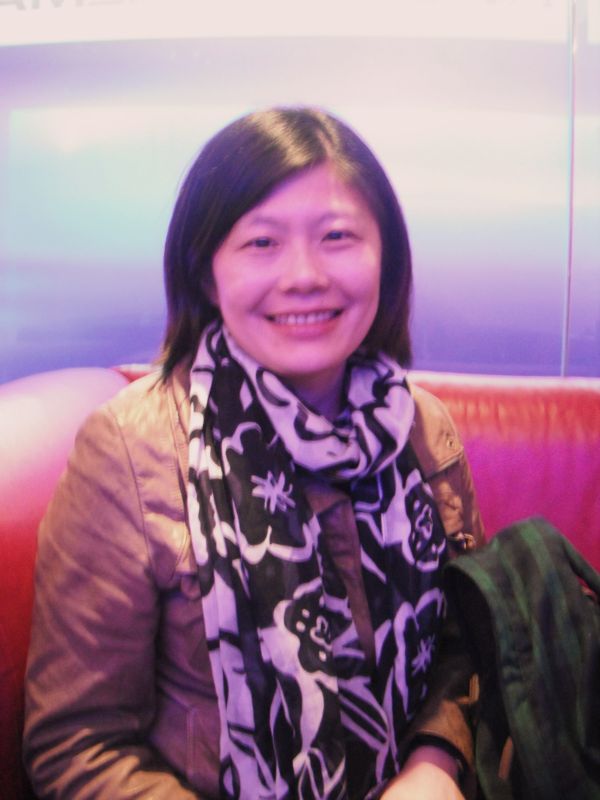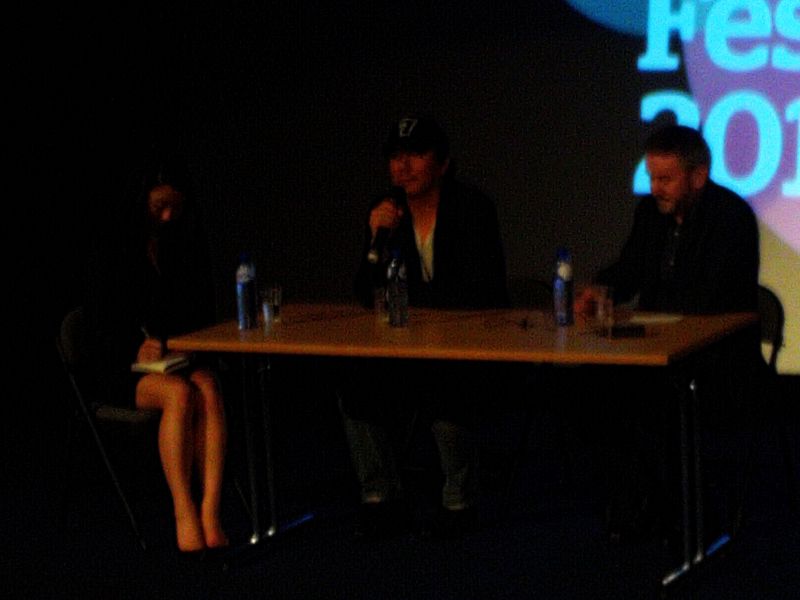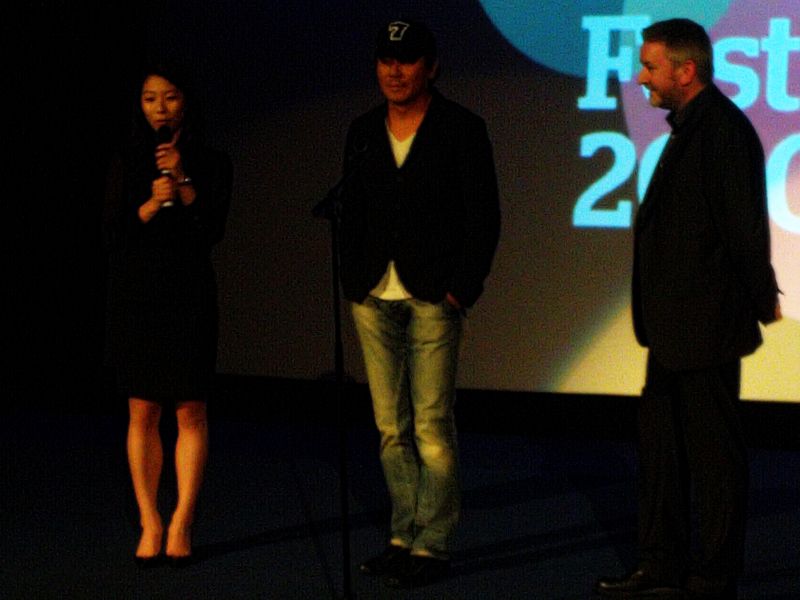|
|
||
|
Pro Tools
FILMFESTIVALS | 24/7 world wide coverageWelcome ! Enjoy the best of both worlds: Film & Festival News, exploring the best of the film festivals community. Launched in 1995, relentlessly connecting films to festivals, documenting and promoting festivals worldwide. Working on an upgrade soon. For collaboration, editorial contributions, or publicity, please send us an email here. User login |
LKFF - Interview with Kim Jee-woon (I SAW THE DEVIL)
Tania: I would like to ask you about your background, you were a theatre director and then you went into film. How did that work? Kim Jee-woon: I did theatre in school and I learnt acting then, but people around me told me not to, so I stopped. It was in my early 20's that I learnt that there is someone behind the actors of the stage and that a production needs an overall leader behind everything and that's when I learnt the role of a director. Tania: So how did that translate into film? Kim Jee-woon: I felt that drama would be a good start which is why I learnt theatre. The curriculum was the whole of the arts where you learnt everything, but the theatre acting was also for film; I started with the ancient Greek tragedies. With the goal of making films, I felt I needed the background of all dramas, to learn all the basis. Tania: You said in the Q&A and several interviews that your films have a lot of irony. What is it about irony that attracts you as a filmmaker? Kim Jee-woon: The questions of life that I feel and ask are why do people live and seek for happiness as it is not easy; life doesn't always go in the direction you expect it to. Particularly when it is not the great happiness that we look for, but the smaller things – why don't things work out? By asking these questions, I felt irony there and felt that this irony was linked to the journey of life, so I try to link these to the themes of my films and make that the basis. You can feel this irony in all aspects of life, so to transfer this onto the screen, onto films, is my interest and when that transfer happens it is a commentary on life through films. Tania: When watching I SAW THE DEVIL, it felt to me like a twisted Coen Brothers movie with comic violence straight from a more twisted Tarantino film. Do you consciously decide to refer to films or is it just on a subconscious level? Kim Jee-Woon: The Coen Brothers are one of my favourite directors and I guess it is because we have common emotions and I enjoy watching their films as a reflection that we have a similar perception of life. In reference to the humourous scenes, it wasn't consciously done, but it happens subconsciously on shoot like sparks that just come about and when these moments happen they come quite comfortably to me and ideas spark up. So we film it and if it okay, then I don't edit them out. As I mentioned in the Q&A, to have these diverse genres and frameworks, I don't think it's particularly different from my generation. Tania: In the Q&A, you were asked about the prominence of the vengeance film theme in Korean cinema. I also read that you only tackle a genre once, and with I SAW THE DEVIL, it felt like you were going back to the comic horror from A QUIET FAMILY and the theme of vengeance which is the theme in A BITTERSWEET LIFE. Why did you decide to revisit two genres that you, essentially, already tackled? Kim Jee-woon: Like A QUIET FAMILY, I SAW THE DEVIL does not have the same comedic side, so I don't consider it the same genre. And the revenge theme in A BITTERSWEET LIFE is different as in BITTERSWEET LIFE is more about an individual's mistake for momentarily giving into a woman, so it is more of a revenge to oneself. In I SAW THEDEVIL, it is the same theme of vengeance, but it is more about a character being sold to the vengeance and the extent of that revenge and the sadness of this. I don't think it is the same. Tania: You are known for being interested in providing lots of extras on your DVDs and being quite involved in that aspect of it. Is it important to you that your audience knows what is going behind the scenes, do you think it enhances the audience's experience of the film? Kim Jee-woon: The use of the extras is more because the DVD needs to sell (laughs), but, on the other hand, these people's hardship is involved in the shooting and some scenes get edited out, so this is away of compensating. And there many scenes that are well shot that get edited out so it's a bit like extra service for them. The most important part is that when people buy DVDs, I want to provide them with as much possible and not only enjoyment from the film, but also satisfaction through the specials. Tania: Your inspiration, your process of writing. Just pre-production, production and post-production. Kim Jee-woon: My biggest inspiration is still photography, especially to imagine the before and after of the moments that's captured on the photographs. The emotions that arise in me when I see these photos, keep ongoing in me and become an inspiration. For A TALE OF TWO SISTERS, I had seen a photo of two western girls in white dresses holding grass, it was a back view of these girls and, although it was statically beautiful, I felt a sense of sadness and fear, it made think why did I feel such negative emotions from such a beautiful photo. It made think won't these girls become disillusioned with life as they grow older and this became an inspiration for the film. In the POWER KING, I saw a photograph of a tiger jumping as it saw a prey, but the tiger's face wasn't tense, it was very calm and the photo created a very weird emotion inside me and this became the theme of the film – about a person who is quite, in a way, small in life becoming strong by wearing a mask and facing new challenges. The process between screenwriting and when the print actually gets made involves the trauma of filmmaking with many magic moments in between and you can say there are miracles and magic during each stage. Even with the scenario, after 5 or 10 drafts, you can have a magical moment or after a time of [writer's] block you can come up with a magical moment. Or after meeting an actor or maybe when you're editing, there can be a big jump in the script or after an edit, after you put in the music and the sound – a transformation can happen. These huge hurdles of artistic transformation become the aspects of filmmaking that I particularly enjoy. Tania: How do you work with actors? Preparing them for roles, because, as you said yourself, that the two main actors in I SAW THE DEVIL have two completely different styles of acting. Kim Jee-woon: At first, when you go through the scenario, we make sure that the actors know the full character and, through rehearsals, I'll specify certain things with the actors, but, as with all directors, I can't strongly direct actors, but I see what they do and how they act to see of it fits my overall picture and if it doesn't then, obviously, there will comments – I like to leave them to their craft. How I overcome problems is to have one shoot of the actor's interpretations and one shoot of my interpretation and when I am editing I can use my one (laughs).
13.11.2010 | Tania Martins's blog Cat. : A Bittersweet Life actor Cinema of Korea director Director Entertainment Entertainment festival film Films I Saw The Devil I Saw the Devil interview Kim Jee-Woon Kim Jee-woon Kim Ji-woon Korean Korean cinema LKFF london Neo-noir tackle The Uninvited theatre director writer Interviews
|
LinksThe Bulletin Board > The Bulletin Board Blog Following News Interview with IFTA Chairman (AFM)
Interview with Cannes Marche du Film Director
Filmfestivals.com dailies live coverage from > Live from India
Useful links for the indies: > Big files transfer
+ SUBSCRIBE to the weekly Newsletter Deals+ Special offers and discounts from filmfestivals.com Selected fun offers
> Bonus Casino
User imagesAbout Tania Martins
Tania Martins
Filmmaker. Student. Blogger. Film Critic. Festival Organiser. Freelance Cameraperson. Explorer. Longboarder. WELCOME!
View my profile Send me a message The EditorUser contributionsUser links |




























